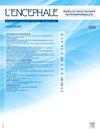Beneficial effects of anticholinesterases: Reducing the anticholinergic load, the missing link of the story?
IF 1
4区 医学
Q4 NEUROSCIENCES
Encephale-Revue De Psychiatrie Clinique Biologique et Therapeutique
Pub Date : 2025-06-01
DOI:10.1016/j.encep.2025.01.010
引用次数: 0
Abstract
Anticholinergic effects are often identified as adverse drug effects. They can manifest at the central level with cognitive disorders and peripherally with various symptoms such as dry mucous membranes, constipation, urinary retention, or even tachycardia. Several studies have also shown that a high anticholinergic burden may be associated with an increased risk of dementia, hospitalization and even mortality. On the other hand, anticholinesterase drugs, through their protective action on acetylcholine, improve cognitive functions but may cause adverse effects such as diarrhea, urinary incontinence, and bradycardia. Large retrospective cohort studies have also shown that anticholinesterase drugs are associated with a reduced risk of mortality. We thus hypothesize, based on these opposing effects, that the symptomatic improvements, both central and peripheral, observed with anticholinesterase drugs could be linked, at least in part, to the reduction of the anticholinergic burden. Further studies are needed to confirm this hypothesis. These studies should investigate the potential positive correlation between the beneficial effects observed with anticholinesterase drugs and the anticholinergic burden.
抗胆碱酯酶的有益作用:减少抗胆碱能负荷,故事的缺失环节?
抗胆碱能作用通常被认为是药物不良反应。它们可以在中枢水平表现为认知障碍,而在外围表现为各种症状,如粘膜干燥、便秘、尿潴留,甚至心动过速。一些研究也表明,高抗胆碱能负荷可能与痴呆、住院甚至死亡风险增加有关。另一方面,抗胆碱酯酶药物通过其对乙酰胆碱的保护作用,改善认知功能,但可能引起腹泻、尿失禁和心动过缓等不良反应。大型回顾性队列研究也表明,抗胆碱酯酶药物与降低死亡风险有关。因此,基于这些相反的作用,我们假设,使用抗胆碱酯酶药物观察到的中枢和外周症状的改善可能与抗胆碱能负担的减轻有关,至少部分有关。需要进一步的研究来证实这一假设。这些研究应探讨抗胆碱酯酶药物的有益作用与抗胆碱能负荷之间潜在的正相关关系。
本文章由计算机程序翻译,如有差异,请以英文原文为准。
求助全文
约1分钟内获得全文
求助全文
来源期刊
CiteScore
4.60
自引率
7.40%
发文量
162
审稿时长
6-12 weeks
期刊介绍:
Une revue française de renommée internationale.
- Un comite de rédaction représentant tous les aspects de la prise en charge psychiatrique du patient.
- Une sélection rigoureuse d''articles faisant l''objet de plusieurs expertises.
- Des travaux d''auteurs et de chercheurs de renommée internationale.
- Des indexations dans les grandes bases de données (Current Contents, Excerpta Medica, etc.).
- Un facteur d''impact qui témoigne de la grande notoriété de la revue.
La tribune des publications originales de haut niveau.
- Une très grande diversité des sujets traités, rigoureusement sélectionnés à travers des sommaires dynamiques :
- des éditoriaux de médecins référents,
- une revue de presse sur les actualités internationales,
- des articles originaux pour approfondir vos connaissances,
- des mises au point et des cas cliniques pour engager votre réflexion sur les indications et choix possibles au travers de mises en situation clinique,
- des dossiers thématiques pour faire le tour d''une question.
- L''actualité de l''AFPB : L''Encéphale publie régulièrement des comptes rendus de l''Association française de psychiatrie clinique.

 求助内容:
求助内容: 应助结果提醒方式:
应助结果提醒方式:


